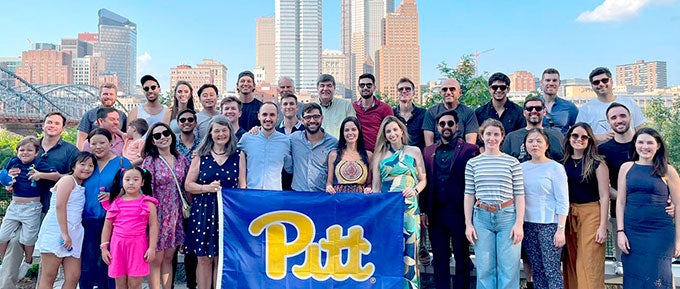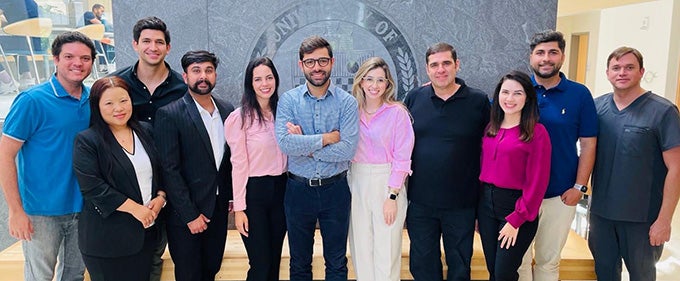
The Clinical Research Program in Periodontics and Implant Dentistry combines didactic education, clinical experiences, and research opportunities to provide students with a baseline education in the field of periodontics and implant dentistry. Students will attend the same courses, seminars, case conferences, and literature reviews offered in the first year of the three-year Department of Periodontics residency program. The curriculum is designed to provide comprehensive and advanced training with time allocated for the development of clinical and translational research.
The availability of diverse courses, combined with dedicated faculty mentorship, ensures that students have the flexibility to customize their educational journey while meeting the high standards set by the program.
Didactic Training
The program integrates extensive didactic training, including seminars, lectures, and literature reviews covering fundamental and advanced topics in periodontics and implant dentistry. Courses will be taken alongside first-year residents in the Department of Periodontics.
Clinical Training
Students actively participate in hands-on demonstrations to acquire practical skills. Training involved treating patients alongside faculty in the patient clinic in the Department of Periodontics, providing a diverse and immersive learning experience.
Research Engagement
Students are integrated into ongoing scientific research projects led by principal investigator(s) (PI). This active engagement in research enhances their understanding of contemporary issues and contributes to the advancement of the field of periodontics.
Educational Environment
The program cultivates a challenging and enriching educational environment, promoting critical thinking, problem-solving, and evidence-based practice in the field of periodontics and implant dentistry.

The program provides students with the opportunity to:
- Expand the scope and depth of their knowledge in periodontics and implant dentistry;
- Learn analytical skills necessary for evaluation of current literature to ensure the capacity for continued, self-directed growth to practice evidence-based dentistry;
- Improve their abilities and confidence for successful public oral presentations in dental conferences, seminars and study clubs;
- Actively participate on basic science (bench top) or clinical research based on department ongoing projects;
- Provide care to their own patients, as well as collect samples from research patients under supervision of the department faculty.
Duration of the program and important deadlines
This is a full-time, 12-month certificate program. Nine positions are available for each cycle.
Inquiries about the program can be sent on a rolling basis, but applications must be placed by January 1, 2025 and close January 31, 2025. There is a one-time, non-refundable application fee of $75.
Interviews are online, via zoom, and happen within the first week of February. Selected students will receive an email with further information around February 17th.
Start date of the program is July 1, 2025.
Clinical experience
Basic and advanced surgical methods lectures and courses (e.g., traditional periodontal surgery, soft tissue grafts, sinus augmentation, guided bone augmentation and onlay graft) are all available as part of the program. Specialized areas of periodontics, such as dental implants, IV sedation, and research may also explore. Students will provide care to their own patients, as well as collect samples from research patients under supervision of the department faculty.
Research experience
Once accepted into the program, the student will be part of a scientific research project and will be mentored by a principal investigator. Research projects will be on clinical research areas, including, evaluation of conditions relevant to clinical periodontics, implant dentistry, hard and soft tissue regeneration and augmentation and soft tissue grafting. Projects on high impact Systematic Review and meta-analysis are also available on topics cited previously.
Evaluation of learning experience
Students will participate on the same written examinations, clinical assessment of hands-on exercises, case presentations and scientific writing exercises as the advanced periodontics residents.
Tuition and Student Support
If accepted into the program, the tuition for the 12-month program is $28,000. The student is also responsible for University Fees of approximately $2,500. For information on payment plans, please visit Pitt's Student Payment Center. The students are responsible for their own living, housing, health insurance and visa expenses related to the program. No funds, scholarships, loans or grants are available for the clinical research program. There is a one-time, non-refundable application fee of $75.
International students will be provided documentation (I-20) in order to apply for a student F-1 visa.
Potential Students and Detailed Admissions Requirements
DDS/DMD/BDS or equivalent degree is required of applicants desiring to explore the full scope of the Clinical Research Program in Periodontics and Implant Dentistry. International applicants must be eligible for an appropriate visa to enter the United States.
Applicants must provide the following information:
- Curriculum vitae
- Course-by-course ECE® evaluation report: American Dental Association (ADA/JCNDE) (ece.org)
- Minimum of two (2) letters of recommendation, maximum of three (3). Letters from individuals familiar with the applicant's academic or research accomplishments are of particular value to the evaluation process.
- Personal statement: Applicants should discuss their intellectual and professional interest in the Clinical Research Program in Periodontics and Implant Dentistry. This statement is a vital part of the application and carries significant weight in our admissions decisions. This statement should appropriately address the following (no more than 1 page in length):
- The applicant’s primary interests during the program and list any relevant background experience that might make the applicant a good candidate.
- Name(s) of potential faculty mentor(s), with whom the applicant would like to work or research interests in the field of periodontics and implant dentistry.
- Applicant’s motivation to obtain a certificate degree and how this will help on the next steps of their career.
- Type of career the applicant is training for (professional goals).
- What are the applicant’s expectations from the program.
- English language test required for students applying from Countries where the official language is not English. A pdf copy of the scores can be submitted via e-mail with the application documents:
- Test Of English as a Foreign Language (TOEFL): Minimum score of 80 (iBT internet test).
- International English Language Testing System (IELTS): The minimum IELTS score is 6.
- Duolingo: The minimum Duolingo score is 110.
- Applicants who have completed or are about to complete a bachelor's degree or graduate degree from an accredited institution in the United States are exempt from submitting English language proficiency test results.
An onsite or video conference interview in English with the faculty involved in the Clinical research program is required.
To apply, please visit the GradCAS website. Find our program by searching for "Clinical Research in Periodontics and Implant Dentistry". This is also where you will upload the documents mentioned above.
Documented Employment Opportunities for Graduates of the Program
Upon completion of this program, students will receive a certificate which will help them achieve a high reputation in areas of academics, research, and scholarship. Employment opportunities include an increased chance to be accepted in a Commission on Dental Accreditation (CODA) accredited graduate program or in the International Advanced Standing Program, which allows qualified, international dentists who graduated from programs not accredited by the CODA to earn a Doctor of Dental Medicine (DMD) degree and later practice in the United States.

